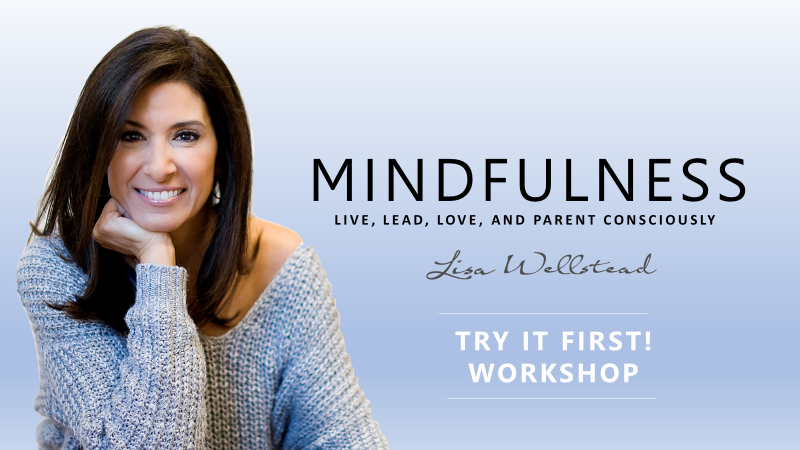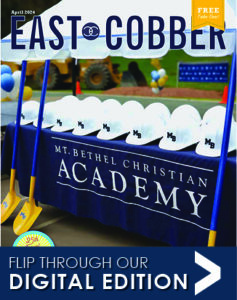Mindfulness is being aware. It’s noticing and paying attention to thoughts, feelings, behavior, and everything else. Mindfulness can be practiced at any time, wherever we are, whoever we are with, and whatever we are doing, by showing up and being fully engaged in the here and now.
Over the holiday I had an opportunity to sit down with William Ellsworth, Walton High School’s (Class of 2019) Valedictorian, Presidential Scholar, Freshman at Stanford University, and friend of my daughter, Katie. Even months after Katie’s graduation I was still intrigued by his surprising “salamander” commencement speech, which ended with a funky-cool rap song. William captured our hearts and attention so eloquently. If you were in the auditorium with me that day you know– his speech flowed so effortlessly and authentically. He literally had us belly-laughing and yet his message was so poignant at the same time. So how could someone so young know so much about life’s struggles and offer so much wisdom for navigating those challenges at such a young age? As a mindfulness educator I was sure he must have had some formal mindfulness training that helped inform the wisdom in his speech. I invited him to sit with me and share his experience with mindfulness training. I invited Katie to share in our conversation too.
LW: William, what brought you to mindfulness meditation?
William: “I guess sometime in middle school my dad introduced me to a few guided meditations on CD and it was pretty cool. I found it really helpful dealing with everything, you know—in middle school”
LW: Yes, we definitely know how stressful middle school can be! We’ve lived through it a few times.
William: “Yes, and then around my sophomore year at Walton, I knew I needed something more. I needed some way to release, and skills to help me keep things in check. So I started googling more on mindfulness and I found a MBSR (Mindfulness Based Stress Reduction) retreat close by. I’ve been meditating ever since.”
LW: So how does mindfulness help you? I imagine the rigor is exceptionally challenging and competitive at Stanford, are you still practicing?
William: “Yes, it’s super challenging, but it’s actually really manageable. I use the mindfulness tools that resonated with me most. I try to meditate for 20 minutes every day as best I can. It’s funny because a lot of people think they don’t have time to fit in an extra 20 minutes, but it’s the reverse. I don’t have time not to meditate. I get a lot more done because I’m more clear-headed and focused. I have more clarity around what’s most important in the moment to channel my attention on so I can stay on track. So for me it’s just a more efficient way to manage my time and energy. It gives me a way to deal with all the challenges and pressure and not waste energy stressing so much about it all.”
LW: Really cool. So, beyond the meditation aspect, has mindfulness practice helped you in other ways?
William: Totally! It makes all of it more enjoyable. Mindfulness taught me how to find value in the process versus the end goal—which really resonated with me. It felt really freeing, and so I’ve applied it to my day-to-day life. It gives me the skills to see my goal-wanting mind for what it is, and then to let go of the thoughts that might actually be undermining what I want. It’s really good stuff.”
LW: That’s pretty cool that you’re so disciplined with it, what’s your secret?
William: “A lot of my college friends are daily meditators too, so that makes it easier; to be in a community that embraces it. I have one friend who meditates an hour every day. He said that if he doesn’t commit to it, he knows that he’ll lose far more time by becoming distracted and mentally lazy. That inspires me to stay with it too, even if it’s just the minimum effective dose. I’m hoping to connect more with the mindfulness community there if I can.”
LW: I might be able to help you with that. I love how you’ve figured out how to use mindfulness selectively, customizing it in a way that serves you the most. I think sharing this experience might inspire others to do the same, and maybe remove some of the stigma around seeking support. So many teens walk around in silent-crisis and don’t know where to go for help.
William: “I hope I can help. It’s really good stuff!”
Parents, can you imagine what our schools would look like, how different life would be if we introduced these skills to students at a young age? There are so many wonderful stories with results just like William’s. Who would *you* be if you could experience life with less stress and more fulfillment and joy? Start writing your life-changing story.

Lisa Wellstead is a Corporate Mindfulness Coach and Educator in Mindfulness-Based Learning Programs. She offers mindfulness trainings for stress-resilience, performance, and wellbeing. Lisa has introduced mindfulness skills to Fortune500 executives, doctors, nurses, counselors, teachers and fire-fighters; supporting high-performance professionals and parents. A few of her clients include Cobb County School District, Northside Hospital, General Electric, SunTrust Bank, and The Georgia Institute of Real Estate Managers.







